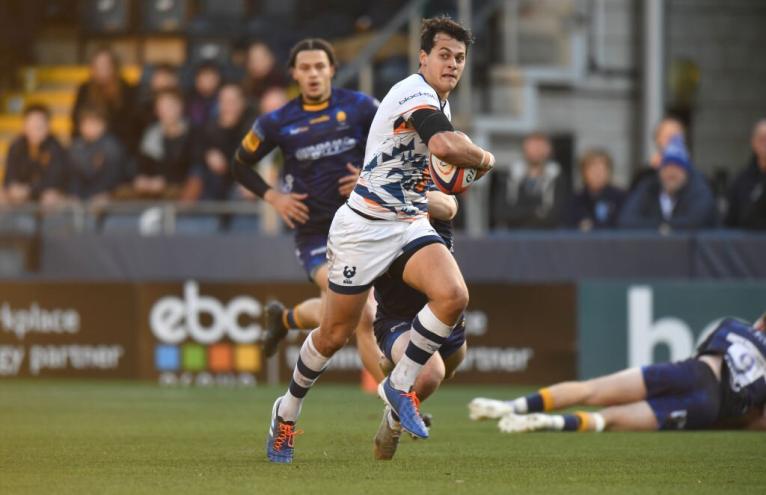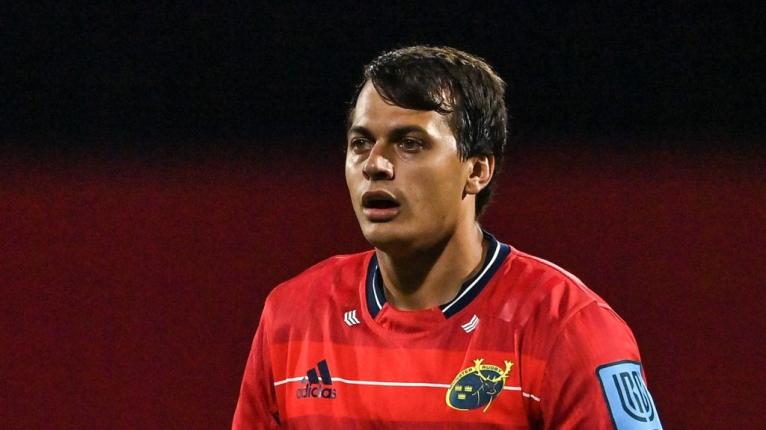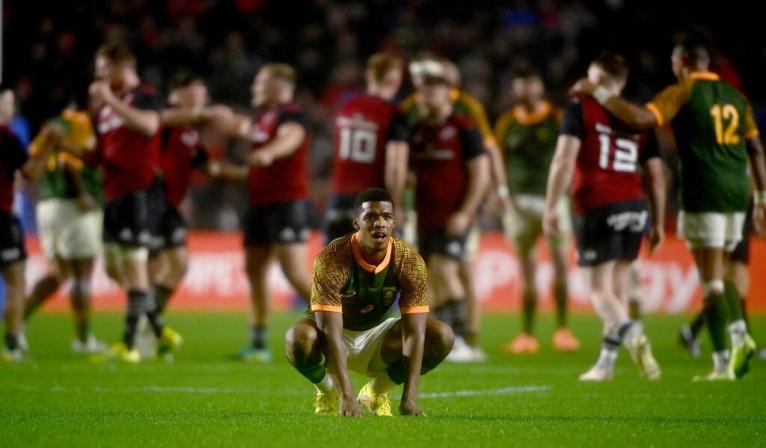Nineteen-year-old Antoine Frisch was called in to the Stade Francais offices, sat down before the bosses, and bluntly cut from the club’s gilded academy.
Frisch had a year left on his espoirs contract, but that didn’t matter. In the eyes of Stade, he was never going to make the step from promising young fly-half to Top 14 string-puller. Morne Steyn, the South Africa totem, and France regular Jules Plisson, stood between him and first-team minutes. The club had listed dangerously throughout the season and the coaches were not minded to throw in a teenage pivot.
So Frisch was cast into the French rugby wilderness. To a boy who had chased this career for as long as he could remember, it was a brutal blow.
“I was basically told, ‘we don’t want to keep you, we don’t think you are going to make it, you’re not good enough’,” Frisch tells RugbyPass. “I took that personally – massively. I knew I was good enough, I just needed that game time, a proper shot, and I didn’t get that.
“It was really frustrating but straight away, it fuelled me. I was like, ‘well, we’ll see in a few years where I’m at and what happens’. I just moved on and decided I was going to get game time wherever; it didn’t matter, I’d find my way.
“You know at that age there is a window and if you don’t get on that train, you are not going to make it, or it’s going to take you a few more years. I went a different route. I just wish they’d backed me at the time and allowed me to develop.”
A lot of those guys were ready at 17, 18, 19; they were good to go. That didn’t happen for me.
This was the first major obstacle on Frisch’s circuitous route to Munster, Emerging Ireland, and maybe, in the not-too-distant future, the Test squad itself. It began in Fontainebleau, a “pretty chill” forest town an hour from Paris, once home to the throne of France. Frisch was raised by a French father and a Devon-born mother, whose own mum was from Dublin. He grew up immersed in Irish culture, drowning in a giant, green cotton Test jersey, and every bit as captivated by Paul O’Connell, Ronan O’Gara and Brian O’Driscoll as he was by the dazzling bohemians of the France backline.
Frisch left home at 15 to board at the rugby academy in Massy, where he met a clutch of stars in the making. He namechecks Sekou Makalou and Cameron Woki, thoroughbred international forwards, Clermont’s Judicael Cancoriet and Lester Ethien, the Stade winger. But while they won senior deals and claimed Top 14 berths, he stagnated. As they became first-team fixtures, he was jettisoned.

“Moving to a rugby academy was what I’d always wanted,” he says. “It was a huge change, going to the suburbs of Paris, but it was what I needed. You connect with boys who grew up in tough parts of Paris. They grew up with nothing. They’re hungry, man. They know they’ve got one shot to succeed.
“A lot of those guys were ready at 17, 18, 19; they were good to go. That didn’t happen for me. I watched on as they played pro early on, and I was still trying to make it.
“I was so happy for those guys because they really deserved it, they were ridiculously talented. But it was quite tough watching them succeed and enjoy playing Top 14.”
Chastened but determined, Frisch went looking for a new home. Nobody in the Top 14 would gamble on such an unknown quantity. No club in the ProD2 took an interest either. He dropped to Federale 1, the third tier of French rugby, and Tarbes, nestled at the foot of the Pyrenees. He was shifted from fly-half to centre, where he has sparkled ever since. And it was there he met James Percival, then a wizened lock forward entering his final year of playing, and now a key man in the Edge Rugby Management agency that represents Frisch.
The derbies in the Pyrenees were really intense, really personal. It was just so good to experience that. There were fights but no cameras, and the touch judges aren’t very helpful.
“In France, clubs will recruit boys who have had a few games and showed something, but when you’ve played with the espoirs for two years and haven’t really had a shot, clubs aren’t even that interested, like, ‘we don’t know this guy’,” Frisch says. “It’s crazy, it’s ruthless in that sense. There are so many other guys like me.
“It was not easy but I was getting loads of game time at Tarbes, I was still improving every week. That’s what I held on to in that time. I still believed I had something to give.
“I was lucky to play with James Percival. He believed in me; he gave me the opportunities that came afterwards because he saw potential.”
From Tarbes, Frisch climbed a division and went back to Massy, this time as a first-teamer. Then it was on to Rouen. The lower leagues of France are not the bearpits they once were, the domain of hairy, hulking props puffing cigarettes before training and the ring for vicious fistfights, but they exposed Frisch to new levels of physicality.

“It was men’s rugby. There’s a huge gap between Top 14 and espoirs. The leagues weren’t as bad as a few years earlier, when it would be fights every weekend.
“There were still some scraps, I’m not gonna lie. The derbies in the Pyrenees were really intense, really personal, when Tarbes played Bagneres-de-Bigorre, about twenty minutes away. It was just so good to experience that. There were fights but no cameras, and the touch judges aren’t very helpful.”
Three years on from Frisch’s Parisian culling, Percival and John Andress, the former Munster prop who founded Edge, touted his name around the Top 14. There were no takers. Frisch reckons that without their efforts, he would still be playing ProD2, or lower. They sent his clips to the Premiership recruiters with the carrot that Frisch was English-qualified. Pat Lam needed a centre and suddenly, an exhilarating opportunity beckoned. Frisch spent last season at Ashton Gate, and though Bristol’s grim campaign was a paltry reflection of the talent in their squad, he was a stand-out performer.
I hear stories of how people would work together during the week and play against each other on the weekend, then play with each other against the All Blacks and win.
“It was always going to be a positive season for me, just being in that environment,” Frisch says. “They really want to improve you every week, they are tough on you but they really want to improve and develop you as a person and as a player.
“Pat is a world-class coach, he thinks differently. I learned so much from the players, you’ve got some GOATs there in Semi Radradra, Charles Piutau, Steven Luatua, John Afoa. Freaks, right?
“In the lower leagues in France, it’s kicking all day and territory and defence and mauling, and that’s it. You go to Bristol and you’re playing from your own 22. It’s a different level.”
Lam was keen to keep Frisch at least another season, but the pull of Munster, the allure of battling for a Test jersey, and a three-year contract at one of the storied giants of European rugby was too tantalising a prospect.
He spent the summer devouring books and articles about the grand history of Munster rugby. He has reconnected with his mother’s extended family, the Healys of Tallaght, who invited him up to the capital for “a proper Irish Christmas”.
And since returning from the Emerging Ireland tour of South Africa, Frisch has been an almighty hit. His 6ft 3ins frame is matched by canny guile and beautiful distribution. His new team-mates have christened him ‘Tony Fresh’, a nod to this array of slick footballing skill.

His first start came against the Springboks Select XV, one of those crackling Munster nights of pride and fervour and lore. He has played Champions Cup rugby and two colossal interpros against Leinster and Ulster.
“The South Africa game, 40,000 in a packed Pairc Ui Chaoimh… that’s when I realised, okay, this is what it’s like to play for Munster. You feel like you can go all day with them behind you.
“The passion is engrained in the community. I’m getting that understanding for what it was like before, that working-class community with all the local clubs playing against each other. I hear stories of how people would work together during the week and play against each other on the weekend, then play with each other against the All Blacks and win. You understand there’s huge history and you just want to be worthy of the jersey.”
Word is, though Ireland would be the most obvious option, Andy Farrell’s staff are not the only coaches keeping a close eye on Frisch. Fabien Galthie is aware of his talents, as are England’s new international ticket. Though Farrell does not want for midfield options, on this form, Frisch will prove hard to ignore. What price a return to France, in emerald green, to compete at a World Cup?
The World Cup is not far away. I’m just going for it. No thinking, just going for it.
“There are no words to describe what that would be like,” he says. “International rugby is my dream. It’s what I’ve always wanted. It’s why I play. I want to play Six Nations and World Cups. I want to do everything.
“I haven’t done much at all yet: a few games in the Premiership, a few in the URC, two in the Champions Cup. That’s all.
“It’s through your performance week in, week out that things happen. The World Cup is not far away. I’m just going for it. No thinking, just going for it.”
Over six years have passed since the sit-down and the dismay and the contract-less state that was the making of Frisch. He would never trade his years in the ProD2, his stint at Bristol or his new life in Ireland for a straight path to the Stade starting jersey.
“Definitely not. I met some unbelievable people in those three years in the lower leagues and Bristol wouldn’t have happened if I had stayed at Stade, Munster wouldn’t have happened. I wouldn’t change anything.”
And why would he, when the road less travelled has delivered such rich experiences while carrying him forth towards Test rugby. The road ahead will be equally compelling.


Comments
Join free and tell us what you really think!
Sign up for free